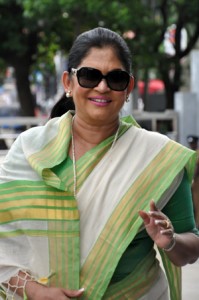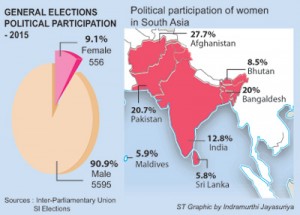News
Women have the vote, now give them the seats
View(s):Female representation in the next parliament is likely to remain low with less than 10 per cent of the 6,151 candidates contesting the election being women. Only 556 of the candidates from 21 political parties and independent groups contesting the election are women – just 9.2 per cent of the total.

The State Minister of Women and Child Affairs, Rosy Senanayake
“Female representation in the last parliament was less than 6 per cent, with 13 women legislators elected in 2010,” said Kumudini Samuel, Senior Programmer and Research Associate at a leading women’s rights organisation, Women and Media Collective (WMC).
Women make up 52 per cent of Sri Lanka’s population and half of those eligible to vote are female but the country is still ranked low on the global index of women’s political representation, standing at 140 out of 153 countries.WMC has begun a campaign called “Vote for Women”, to ensure their greater representation and participation in parliament from this year onwards.
Women in Sri Lanka had the right to vote from as early as 1931 have had very little chance to become elected representatives in parliament or in provincial and local government, Ms. Samuel said. Having mandatory quotas of large numbers of women on party nomination lists would convey the message to the public that they are being given a genuine choice in male/female representation.
“If we need a change in the country and the system, we do need to vote for suitable women candidates,” Ms. Samuel said.
“There is no democracy without fair representation of women at the highest level of government; there is no good governance unless marginalised voices are given a chance to speak; there is no development unless women can contribute to Sri Lanka as equal representatives in government”.
The State Minister of Women and Child Affairs, Rosy Senanayake, said representation of women at the forthcoming general elections has been vigorously contested issue, with a wide range of women ranging individually and collectively calling for a change.
 “I’ve been fighting for a very long period and when I presented an amendment to the Local Authorities Act, it did not get due recognition in the parliament, the reason given that it was not relevant,” she said. Ms. Senanayake said being able to convince decision-makers to increase the women’s quota in the proposed electoral reforms under the 20th Amendment was a turning point. However, the Amendment was not passed as parliament was dissolved.
“I’ve been fighting for a very long period and when I presented an amendment to the Local Authorities Act, it did not get due recognition in the parliament, the reason given that it was not relevant,” she said. Ms. Senanayake said being able to convince decision-makers to increase the women’s quota in the proposed electoral reforms under the 20th Amendment was a turning point. However, the Amendment was not passed as parliament was dissolved.
She pointed out that there were more than enough women with value and vision to be a part of active politics.“Women are engaged in public and private sectors in various classifications of work but their numbers at the decision-making level are insufficient,” she said, adding that more women with good leadership skills needed to come forward.
“There are 17 female candidates – 15 on the contesting list and two on the national list – for the United National Party (UNP) in election,” she said. Despite being the first country in the world to produce a female prime minister, Sirimavo Bandaranaike, the political participation of women in Sri Lanka was vastly inferior to other South Asian countries, she added.
Just 5.8 per cent of seats in Sri Lanka’s current parliament are held by women. In comparison, women hold 20 per cent of seats in Bangladesh’s unicameral parliament, 20 per cent of seats in Pakistan’s bicameral legislature and about 12 per cent of seats both houses of the Indian parliament.
Sivalingam Sathishkumar, spokesperson for the Ministry of Women Affairs, agreed, saying that when comparing other Asian countries’ female representation in parliament, Sri Lanka needed to improve rapidly.
Mr. Sathishkumar said fielding women candidates is one thing, but being successfully elected was a different matter.

